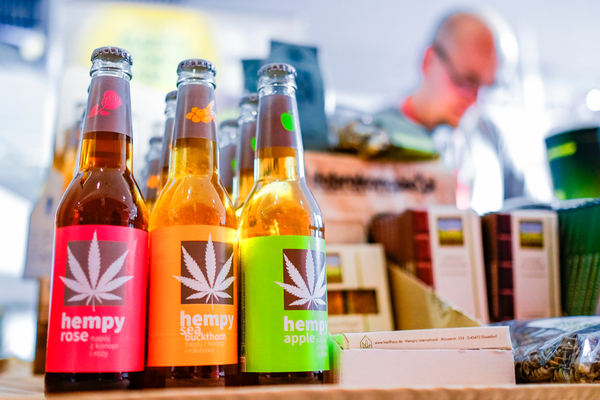Part of the appeal of Pabst Blue Ribbon is the brand’s underdog story. Practically forgotten by the turn of the millennium, a groundswell of support helped bring the brand back to its current prominence. Among Pabst many innovations over the past few years — including hard coffee, hard seltzer, hard tea, and whiskey (no “hard” needed) — in 2020, now Pabst has granted the rights to Pabst Labs to begin making the non-alcoholic but THC-laced Pabst Blue Ribbon Cannabis Infused Seltzer.
The new seltzer is non-alcoholic, but it contains 5mg of THC, or tetrahydrocannabinol, along with purified water, lemon concentrate, sugar and other flavors. It’s now being sold in cannabis dispensaries, costing $24 for a four-pack. The seltzer is also sold online, with delivery possible in Los Angeles, Sacramento, the Bay Area, and Humboldt County.
Though not the first cannabis beverage with a beer pedigree, the hope was that the PBR brand would have crossover appeal with the marijuana crowd. And apparently, Pabst was right. “The response has been overwhelming,” says Mark Faicol, the brand manager at Pabst Labs. “And right now our challenge is really producing enough product to keep up with demand from retailers.”
Pabst Labs is run by former PBR employees. Their connections eased the path to put the Pabst brewery’s name on cans that promise a different kind of buzz to PBR consumers. Pabst Labs has recently announced they’re opening a new “cutting edge manufacturing facility and distribution center” in Desert Hot Springs, California — further described as “one of the few dedicated cannabis beverage facilities in America” — which will allow the company to more than triple its production capabilities.
So, who’s the target consumer for a THC seltzer?
As NPR reports, it’s aimed at what Rick Maturo, Nielsen’s associate director of client services for cannabis practice, calls the “canna-curious” — people who might have some experience with marijuana, but aren’t frequent users. Now they’re being offered cannabis in a format that doesn’t require smoking, vaping, or eating.
Faicol says the single-serving cans and low- to medium-dosage of THC should also help ease concerns of getting too intoxicated. He adds that the liquid extract in the seltzer will help people gauge its effects. “It’s going to have an onset time of 20 to 30 minutes, which is a lot quicker than many other edible products,” he says, adding that wary drinkers could also stop halfway through a can to further control their dosage.
Maturo says some people already view THC beverages in much the same way they see alcoholic beverages. “Certainly it’s a way to relax and unwind at the end of the day,” he says, adding, “People are using it for what we refer to as ‘experience enhancement,’ so just taking a regular activity and adding a new spin to it, with either THC in this case or in some cases alcohol.”
Beyond its eponymous Pabst Blue Ribbon 10mg High Seltzer, Pabst also produces Not Your Father’s Cannabis Infused Root Beer and the St. Ides Cannabis product line (which includes their 100mg infused four-ounce shots). Other brands will be allowed to access the facility through co-packaging relationships, as well, which Pabst says should help “raise beverage quality and opportunity across the industry.”
Pabst said data shows that THC-infused beverages are seeing a 40 percent growth rate, the fastest growing category in the cannabis industry, according to the Cannabis Beverage Association (CBA). Additionally, data from the cannabis-focused analytics company Headset suggests that PBR High Seltzer is one of the top-selling THC-infused carbonated beverages in California. Pabst is not the only brewer to get involved with THC-infused beers. California’s Lagunitas Brewing Company has partnered with a THC extract company to create a separate line of hoppy seltzer drinks called Hi-Fi Hops, for instance.
But don’t expect to see a cannabis version of PBR outside of dispensaries any time soon. “You’re not going to be able to go into a grocery store, obviously, and buy this,” Faicol says. Faicol says the THC beverage market is predicted to eventually be worth billions of dollars. But for now, the sector is pretty small. THC drinks represented only about 1% of all legal cannabis sales in 2019 – totaling around $64 million, Maturo says. Those figures reflect California, Colorado, Washington, Oregon and Nevada — five states where cannabis has been legal long enough for Nielsen to compile a year’s worth of data.
For the THC beverage market to grow, it will have to overcome several hurdles, from marijuana’s murky regulatory standing to social norms that often support drinking Bud, not bud. Then there are the logistical challenges of making, transporting and selling drinks — something that many cannabis companies have little experience in.
But rapid growth could come if legalization spreads. Maturo cites Nielsen data that shows “a pretty big jump” in public interest in drinking THC-infused beverages if they become legally available — which could translate into growth of about 400% by 2025.
—
Photo Credit: paparazzza / Shutterstock.com
